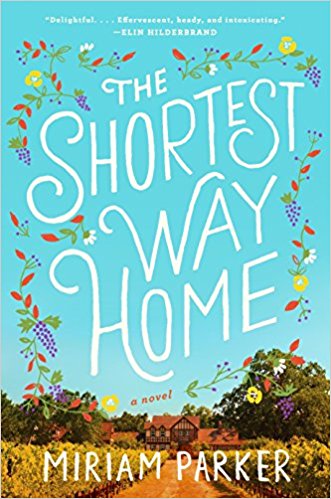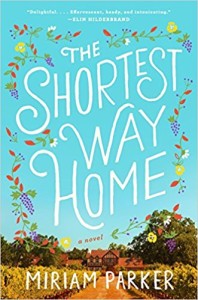
A Romantic Novel That Acknowledges the Limits of Romance
 At the end of the summer, I was happy to curl up with a book that takes place in a beautiful winery, with two handsome male characters vying for the protagonists hand. It sounds fun and escapist–and it is! But Miriam Parker’s The Shortest Way Home goes deeper than its bubbly, clear surface, subtly questioning conventional definitions of success for its heroine, Hannah, who begins the novel with a lucrative job and a rich boyfriend.
At the end of the summer, I was happy to curl up with a book that takes place in a beautiful winery, with two handsome male characters vying for the protagonists hand. It sounds fun and escapist–and it is! But Miriam Parker’s The Shortest Way Home goes deeper than its bubbly, clear surface, subtly questioning conventional definitions of success for its heroine, Hannah, who begins the novel with a lucrative job and a rich boyfriend.
She ends it in a far different place. Lilith spoke to Parker about undercutting rom-coms, learning about wine, and her favorite Jewish feminists.
What inspired you to set the book in wine country?
The germ of it began a long time ago. In around 2010, I was out in California for work, and by myself, I got a little hotel room in downtown Sonoma, walked around, and fell in love with the place. I even found a winery and ended up signing up for the wine club so every few months these wines would show up and remind me.
I was writing then, inspired by NaNoWriMo, but not this book–but I kept thinking, “That was a good place.” So when I came to write this book, what I wanted to do was write a book about all the things I love and take a mental vacation. I go to a desk every day in NY. So my writing time is an hour or two in the mornings, in the weekends, on vacation. I thought to myself, I love that place—I wanted to go there every day.
Did you know all the terms for wine or did you have to research?
During the course of writing the book, I went back to wine country and rented a cottage. In the afternoons I would take the dog with me in the car and drive around and interview people. The details in the book are from those interviews.
At the very end, I took a wine class because I need more vocabulary. I wrote down all the crazy descriptions the teacher used and sprinkled them in as Hannah learned the trade. I wanted it to be a journey for Hannah–she’s acquiring these new terms along with the reader and the author.
What made you decide to go for an unorthodox ending?
That was the one thing I was uncompromising about. I sort of give away the ending in the epigraph, which is “I choose me.” That was a story I wanted to tell. For so many women, maybe the world is telling them that finding the right man is going to be the solution to their problems, the end of their story. I hate that as a narrative, because it’s not true. It’s an answer, but you have to deal with all the other things too.
A lot of this book seems to subtly question Hannah’s relationship to conventional ideas of success, both financial and also romantic–do you think about these issues a lot?
There’s a pot of gold that people are chasing–happiness might not be in it. Especially when I was graduating from college, I had classmates in finance who were able to travel around the world, but I’ve seen a lot of people have those mid-life crises and wondered why do they do this. I’m in publishing, and even though it’s not the most lucrative career, its a career I love.
Have you watched “Crazy ex-Girlfriend”? Do you see yourself as part of a trend that’s deconstructing the romantic comedy trope? I love a traditional rom-com–Crazy Rich Asians is one of the most fun movies I’ve seen in years and it’s a very classic rom-com. But you’re always trying to tell stories that are relevant to our lives now. And I think a lot of women today are trying to figure out at 20, 30, 40—how do I make myself happy? There’s this idea you’re sold of a happy ending—but what if it doesn’t work out that way? What else is out there?
You could have a glass of wine with any Jewish feminist from history or the future—who would it be?
Rebecca Traister. Her book “All the Single Ladies” about the power of unmarried women, is one that i was thinking about when I was writing this book. She’s such a smart commentator and I’d just want to listen to her brain work.
And then Grace Paley. I remember reading her stories in college and feeling like she was an icon of telling women’s stories in an interesting way, but also a subversive way.



